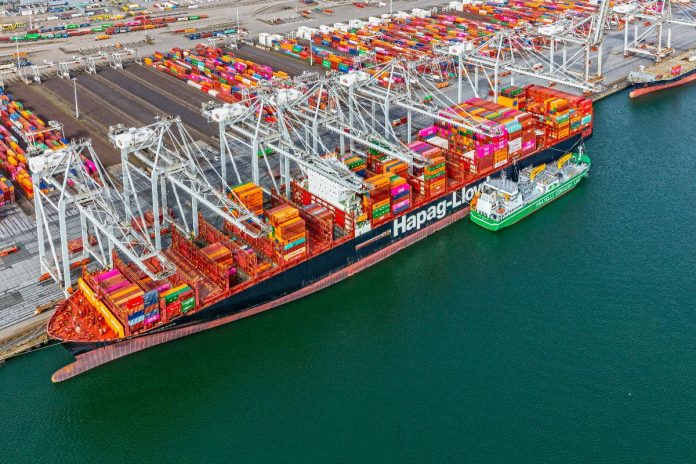Hapag-Lloyd and Seaspan Corporation have forged a partnership agreement to retrofit and convert five 10,100 TEU container ships.
These vessels, originally powered by conventional MAN S90 engines, will transform dual-fuel engines capable of running on methanol. Post retrofitting, the vessels will remain under long-term charter from Seaspan to Hapag-Lloyd.
“The methanol retrofit project is a further step in our ambitious sustainability agenda, which aims to achieve the decarbonisation of the entire fleet by 2045. By enabling these vessels to use green methanol as of 2026, we will meet our customers’ growing demand for green transportation solutions.” Regarding the initiative, Rothkopf also added: “With Seaspan, we benefit from a valued partner with deep experience, a wide supplier network and scale,” stated Dr. Maximilan Rothkopf, Hapag-Lloyd’s Chief Operating Officer (COO).
In pursuit of its strategic decarbonization objective, Hapag-Lloyd is directing investments not only towards new buildings or retrofits such as dual-fuel propulsion and optimizing the efficiency of its existing fleet through the Fleet Upgrade Program but also towards exploring and sourcing green fuels. Among these, green methanol is emerging as a promising low-emission fuel for the future.
The vessels slated for retrofits include the “Seaspan Amazon,” “Seaspan Ganges,” “Seaspan Thames,” “Seaspan Yangtze,” and “Seaspan Zambezi.” The retrofitting process is anticipated to span approximately 80-90 days per vessel, commencing in the first quarter of 2026. The overall investment for these five units is estimated at around US$120 million.
“Collaboration between strong and like-minded partners, Hapag-Lloyd and Seaspan, drives innovation. Retrofitting must be an integral part of the strategy if the container shipping industry wants to deliver on its decarbonisation targets,” said Torsten Holst Pedersen, Chief Operating Officer of Seaspan.







